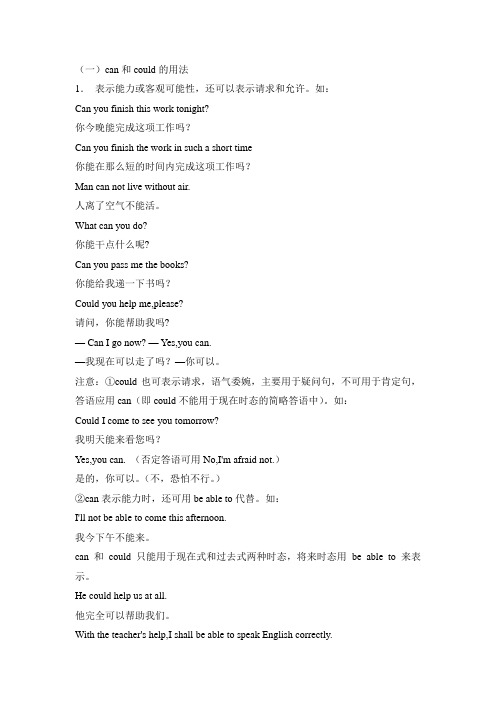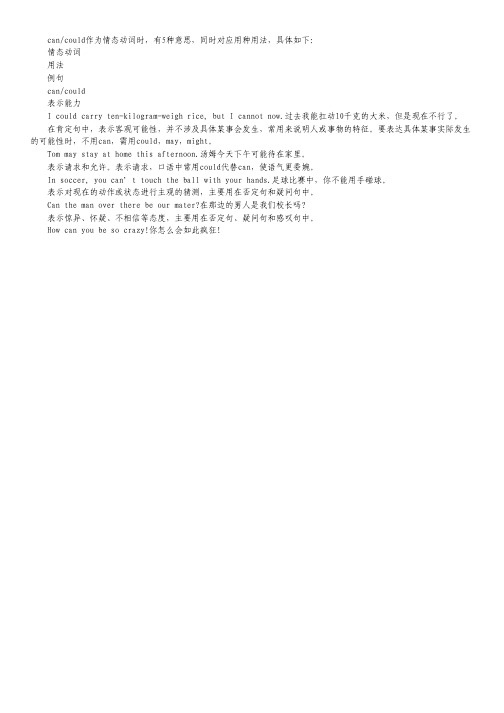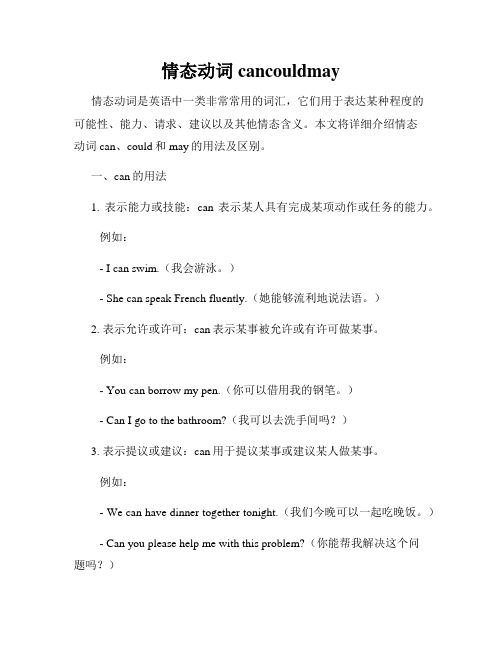考研英语:语法大全(情态动词-can,could).doc
(完整word版)情态动词can(could),may(might)的用法

(一)can和could的用法1.表示能力或客观可能性,还可以表示请求和允许。
如:Can you finish this work tonight?你今晚能完成这项工作吗?Can you finish the work in such a short time你能在那么短的时间内完成这项工作吗?Man can not live without air.人离了空气不能活。
What can you do?你能干点什么呢?Can you pass me the books?你能给我递一下书吗?Could you help me,please?请问,你能帮助我吗?— Can I go now? — Yes,you can.—我现在可以走了吗?—你可以。
注意:①could也可表示请求,语气委婉,主要用于疑问句,不可用于肯定句,答语应用can(即could不能用于现在时态的简略答语中)。
如:Could I come to see you tomorrow?我明天能来看您吗?Yes,you can. (否定答语可用No,I'm afraid not.)是的,你可以。
(不,恐怕不行。
)②can表示能力时,还可用be able to代替。
如:I'll not be able to come this afternoon.我今下午不能来。
can 和could 只能用于现在式和过去式两种时态,将来时态用be able to 来表示。
He could help us at all.他完全可以帮助我们。
With the teacher's help,I shall be able to speak English correctly.由于老师的帮助,我将能准确地讲英语。
2. “can”表达推测例:Can the news be true? 这消息会是真的吗?The news can't be true. 这消息不会是真的吧。
(完整版)情态动词must、can、could、may、might精解

would :1. 表will的过去,用于过去将来时2. 表"意愿",乐意做某事3. 虚拟语气could: 1. 表can的过去,表过去的能力2 表请求(婉转语气)3. 表猜测:可能是...4. 虚拟语气should: 1. 表shall的过去,用于过去将来时,搭配第一人称2. 表婉转的语气: 应该做...3. 虚拟语气might: 1. may的过去,表猜测:可能是2. 表许可(婉转语气)may: 1. 表猜测: 可能是2. 表许可think of 想起, 想到; 没有think from的用法一.shall和will的用法1、shall 用在第一、三人称,will 用于第二人称表示“征求意见”。
Shall I go now?Shall we invite her, too?Will you help me with the work?Shall the reporters wait outside or what?2、shall表示依据规定有义务去做。
Passengers shall not talk with the driver while the bus is moving.3、shall 用于所有人称,表示说话人的许诺、威胁、警告、命令等。
You shall have an answer by tomorrow.If he’s good, he shall have a new watch for Christma s.If you children don’t do as I tell you, you shan’t go to the party.4、would 可以表示过去的习惯(would 可表示反复发生的动作或某种倾向。
used to表示过去的习惯动作或状态,强调现在已不存在)He would come to see me on Sunday when he was here.The dog would lie there in the sun all afternoon.When we were children, we would go skating every winter.5、will可以表示“愿意”,而非将来:I will pay you for it. 我会付给你钱买下它的。
考研语法小知识:情态动词can和could

can/could作为情态动词时,有5种意思,同时对应用种用法,具体如下:
情态动词
用法
例句
can/could
表示能力
I could carry ten-kilogram-weigh rice, but I cannot now.过去我能扛动10千克的大米,但是现在不行了。
在肯定句中,表示客观可能性,并不涉及具体某事会发生,常用来说明人或事物的特征。
要表达具体某事实际发生的可能性时,不用can,需用could,may,might。
Tom may stay at home this afternoon.汤姆今天下午可能待在家里。
表示请求和允许。
表示请求,口语中常用could代替can,使语气更委婉。
In soccer, you can’t touch the ball with your hands.足球比赛中,你不能用手碰球。
表示对现在的动作或状态进行主观的猜测,主要用在否定句和疑问句中。
Can the man over there be our mater?在那边的男人是我们校长吗?
表示惊异、怀疑、不相信等态度,主要用在否定句、疑问句和感叹句中。
How can you be so crazy!你怎么会如此疯狂!。
情态动词can (could), may (might) 等的用法

情态动词有can (could), may (might), must, have to, shall (should, will (would), dare (dared), need (needed), ought to等。
情态动词无人称和数的变化;不能单独使用,必须与其后的动词原形构成谓语一、can, could1) 表示能力(体力、知识、技能)。
Can you lift this heavy box?(体力)Mary can speak three languages.(知识)Can you skate?(技能)此时可用be able to代替。
Can只有一般现在时和一般过去式;而be able to则有更多的时态。
I’ll not be able to come this afternoon.当表示“经过努力才得以做成功某事”时应用be able to,不能用Can。
如:He was able to go to the party yesterday evening in spite of the heavy rain.2) 表示请求和允许。
-----Can I go now?----- Yes, you can. / No, you can’t.此时可与may互换。
在疑问句中还可用could,might代替,不是过去式,只是语气更委婉,不能用于肯定句和答语中。
---- Could I come to see you tomorrow?---- Yes, you can. ( No, I’m afraid not. )3) 表示客观可能性(客观原因形成的能力)。
They’ve changed the timetable, so we can go by bus instead.This hall can hold 500 people at least.4) 表示推测(惊讶、怀疑、不相信的态度),用于疑问句、否定句和感叹句中。
情态动词cancouldmay

情态动词cancouldmay情态动词是英语中一类非常常用的词汇,它们用于表达某种程度的可能性、能力、请求、建议以及其他情态含义。
本文将详细介绍情态动词can、could和may的用法及区别。
一、can的用法1. 表示能力或技能:can表示某人具有完成某项动作或任务的能力。
例如:- I can swim.(我会游泳。
)- She can speak French fluently.(她能够流利地说法语。
)2. 表示允许或许可:can表示某事被允许或有许可做某事。
例如:- You can borrow my pen.(你可以借用我的钢笔。
)- Can I go to the bathroom?(我可以去洗手间吗?)3. 表示提议或建议:can用于提议某事或建议某人做某事。
例如:- We can have dinner together tonight.(我们今晚可以一起吃晚饭。
) - Can you please help me with this problem?(你能帮我解决这个问题吗?)1. 表示过去的能力或技能:could用于过去时态,表示过去某人具备的能力或技能。
例如:- When I was young, I could climb trees easily.(当我年轻的时候,我可以轻松地爬树。
)- He could speak three languages fluently when he was in college.(他在大学时能够流利地讲三种语言。
)2. 表示礼貌的请求:could用于礼貌地请求对方做某事。
例如:- Could you pass me the salt, please?(请你递给我盐好吗?)- Could I have a glass of water, please?(我能请你给我一杯水吗?)3. 表示非真实条件:could用于虚拟语气,表示非真实的条件或假设。
情态动词can和could之基本用法

许可: 1、can表示将来的许可通常与将来时间状语
连用。 (can表示能力时不需要时间状语) 2、could往往表示过去的许可
建议:could表示现在或将来时间,而不表示是 过去时间
请求: 1、Can \Could I\we---?表示请求对方允许我们
做某事 2、Can \Could you----?表示请求对方为我们做
昨天我追赶了一辆车,而且追上了它。
•表示许可(一般不用于表示现在的许可,而表示 过去的许可)
I could read what I liked when I was a child. 我小时候喜欢看什么书,就看什么书。
•表示建议和忠告(并不表示是过去时间) You could pick up a cake ,chocolate is her
can\could-------be able to may\might-----be allowed to must---------have(got)to shall\should\ought to-----be supposed to will\would-------be going to
The boy can be very naughty. 这孩子可能会很淘气。
情态动词can和could 之基本用法
水建锋
特殊用法 ↑
基本用法 ← 情态动词 → 推测性用法 ↓
(could \would\might\should) 用于虚拟意义的用法
can\could\may\might\will\would\ should\ought to\shall\must
need dare
favorite. 你可以买一份蛋糕嘛,巧克力口味的她最喜欢。
情态动词can和could用法详解.docx

情态动词 can 和 could用法详解can 和 could用法详解1.表示能力, could 是 can 的过去。
如:Can you speak English?你会说英语吗?Could you speak English then?那时候你会说英语吗?2.表示许可,注意以下用法:(1)对于现在或将来的“许可” ,要区分以下两种情况:a.表示请求允许( 即请求别人允许自己做某事) ,可用 can(=may) 或 could(=might)(这里的 could并不表示过去,而是表示现在,只是语气较委婉) 。
如:Can [May, Could, Might] I come in?我可以进来吗?b.表示给予允许( 即自己允许别人做某事) ,一般只用can(=may) ,而不能用could或might。
如:A: Could [Can] I use your pen?我可以借用你的钢笔吗?注意:B:Yes, of course you can. 当然可以。
( 注意 : 此处不用 Yes, you could)(2)对于过去的“许可” ,也要区分以下两种情况:a.表示过去一般性允许( 即表示某人随时都可以做某事) ,用 can 的过去式 ( 即 could)When I lived at home, I could watch TV whenever I wanted。
如:to. 我住在家里时,想什么时候看电影就可以什么时候看( 一般性允许 ) 。
b.表示过去特定的允许(即表示在过去某一特定情况下允许进行某一活动) ,则不用而需换成其它表达( 如: had permission或was [were] allowed to)。
如:I was allowed to see the film yesterday evening.昨天晚上允许我去看了电影could, ( 特定的允许,所以不能用could)。
3.表示推测:(1)对现在或将来的推测, can 通常只用于否定句或疑问句中,一般不用于肯定句:It can’ t be true.那不可能是真的。
情态动词can和could用法详解

情态动词c a n和c o u l d用法详解 Document number【980KGB-6898YT-769T8CB-246UT-18GG08】情态动词can和could 用法详解can 和 could 用法详解1. 表示能力,could 是 can 的过去。
如:Can you speak English 你会说英语吗Could you speak English then 那时候你会说英语吗2. 表示许可,注意以下用法:(1) 对于现在或将来的“许可”,要区分以下两种情况:a. 表示请求允许(即请求别人允许自己做某事),可用 can(=may)或could(=might)(注意:这里的 could 并不表示过去,而是表示现在,只是语气较委婉)。
如:Can [May, Could, Might] I come in 我可以进来吗b. 表示给予允许(即自己允许别人做某事),一般只用 can(=may),而不能用 could 或 might。
如:A: Could [Can] I use your pen 我可以借用你的钢笔吗B: Yes, of course you can. 当然可以。
(注意: 此处不用 Yes,you could)(2) 对于过去的“许可”,也要区分以下两种情况:a. 表示过去一般性允许(即表示某人随时都可以做某事),用 can的过去式(即could)。
如:When I lived at home, I could watch TV whenever I wantedto. 我住在家里时,想什么时候看电影就可以什么时候看 (一般性允许)。
b. 表示过去特定的允许( 即表示在过去某一特定情况下允许进行某一活动),则不用 could, 而需换成其它表达(如:had permission或 was [were] allowed to)。
如:I was allowed to see the film yesterday evening. 昨天晚上允许我去看了电影(特定的允许,所以不能用 could)。
- 1、下载文档前请自行甄别文档内容的完整性,平台不提供额外的编辑、内容补充、找答案等附加服务。
- 2、"仅部分预览"的文档,不可在线预览部分如存在完整性等问题,可反馈申请退款(可完整预览的文档不适用该条件!)。
- 3、如文档侵犯您的权益,请联系客服反馈,我们会尽快为您处理(人工客服工作时间:9:00-18:30)。
can (could)用于否定或疑问句中后面跟动词原形的完成式时,表示对过去发生事件的“可能性”。
而could较can更加表示说话人的“不肯定的”语气。
如:
Can he have left already?他会是走了吗?
Could she have forgotten my address?她会把我的地址忘记了吗?
It couldn't have been henry. He has gone to the factory.不可能是亨利,他已经去工厂了。
Surely she can not have arrived so early.他当然不可能这么早到这里的。
注:could加动词的完成式时,有时表示“过去可能完成但事实上并没有实现的动作”。
如:
You could have done the work better.你本来可以做得更好些。
(事实上你做得不那么好)
You could have got the early train.你本来可以搭上早班火车的。
(事实上没搭上)。
